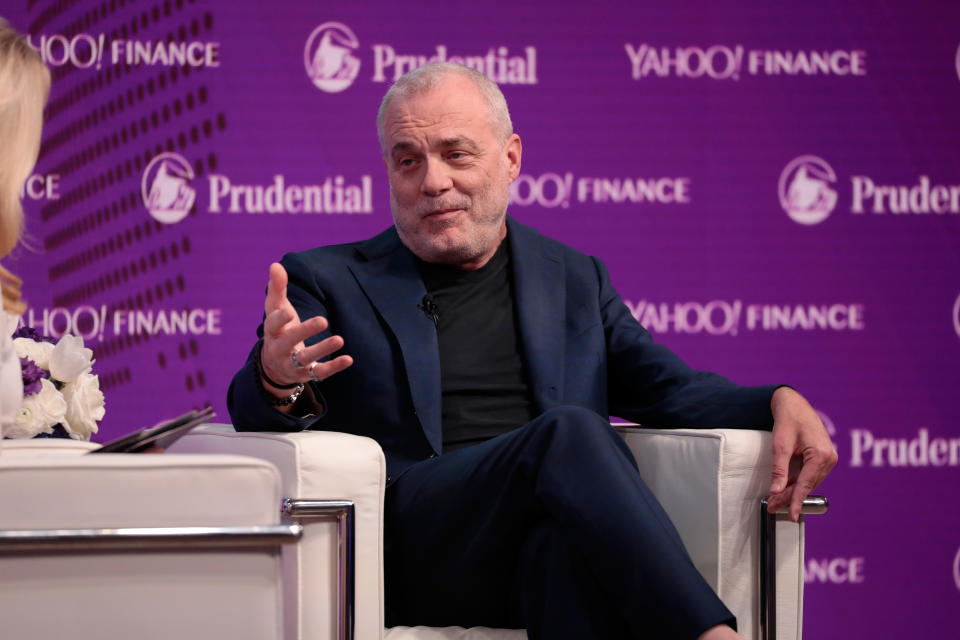Ex-Aetna CEO hits 'broken' capitalism, calls for end to 'lip service' on needed change
Mark Bertolini is calling for investing in workers, education, and taking a holistic approach to healthcare as the path forward to restoring the American dream, and fixing capitalism.
With America rocked by social tensions, the debate over inequality has taken on a new dimension. In a recent talk at Verizon Media’s RESET YOUR MINDSET AT WORK, the former Aetna CEO addressed business and tax practices that perpetuate the gap between the wealthy and the working class.
The 64-year-old insurance executive veteran has long spoken out on a capitalist model that’s widely perceived as failing, acknowledging that it's a "broken system."
Bertolini said that "People have been rethinking it. But I think we've been given lip service to the kinds of changes that need to happen.”
In a wide-ranging discussion, Bertolini suggested that companies needed to pay more attention to the development of their employees, in order to address persistent satisfaction and quality of life issues.
"Probably since the early 70s, what we've seen is a flip where financial capital is now plentiful, and human capital is very scarce — well-trained people who know how to learn, and continually evolve with the kind of organization they're in,” noted Bertolini, the author of "Mission-Driven Leadership: My Journey as a Radical Capitalist.”
Yoga as productivity booster

Pointing out that people were treated as a resource that could easily be replaced, Bertolini called out the U.S. tax system, which allows companies to depreciate investments in physical capital like machines, but not investments in human capital.
While running Aetna, Bertolini implemented numerous programs for employees that included tuition and student debt assistance, pay incentives, yoga — and even pet therapy.
In his book, Bertolini recalled how he convinced Aetna's chief medical officer to sign off on a yoga in the workplace initiative by conducting a 12-week study on the impact of mind-body stress reduction.
The effort made Aetna realized that quality of life is a significant source of stress — and those employees with the highest levels had much higher medical costs.
Workers who were encouraged to practice yoga saw a 50% drop in stress levels and an additional 69 minutes in productivity. From there, he began to make other investments in his workforce, including boosting wages.
Those investments in people didn't put a dent in the company's bottom-line, but helped reduce overall health care costs, resulting in more productive and engaged employees and higher customer retention rates.
"And we have not made those investments because, quite frankly, as business people, we aren't rewarded by the tax system to do so. We can't depreciate our investment in people like we can in machines,” he said.
“So machines are a better economic spreadsheet outcome than people are, and I think we've lost our way as a result. So we've got to turn that around," Bertolini stated.
‘Stop teaching to tests’
Education reform has become a focus of discussions about how to improve capitalism. And according to Bertolini “the single biggest thing that we can do to restore the American dream and to improve the quality of our human capital overtime" is to invest more money in K-3 education.
"We should stop teaching to tests — standardized tests — and teach these children how to learn based on the circumstances they're in,” Bertolini said.
“On the other side of it, we then need more people that know how to learn — the ability to re-skill people for the communities they live in, not necessarily for some job halfway across the country, because social mobility, geographic mobility, labor mobility, is all but stopped, while people stay in their communities where their families are, and their social networks are,” the executive added.
Bertolini is of the view that businesses have a responsibility to make life better for employees, both in the workplace and at home. What's more, improving the health and well-being of communities has positive effects on families, communities, and the broader economy.
Of all the variables that are looked at to measure the economy, Bertolini suggested the one that’s lacking in attention is “the human condition, in and of itself, where people live, how they live, the kind of circumstances they have when they're not at work, actually do matter.”
He added: “And that's come fully to the fore here as we've gone through this crisis," Bertolini said, pointing out that the economic toll of the COVID-19 crisis is more than the U.S. spends on healthcare monthly.
In the early 2000s, Bertolini was forced to contend with two health crises that led him to yoga and meditation. One involved his then-16 year old son who developed a rare form of lymphoma, and another was Bertolini’s own spinal cord injury in a ski accident.
Those events profoundly shaped his views of the health care system, the patient experience, and leadership in corporate America. It also led to him using yoga and meditation to manage pain without the use of drugs, Bertolini said.
"I think is the result of having to sit with my son for a year in the hospital as he fought cancer and my own accident, I realized that the system was not set up to recreate the human experience for you after you got 'well,'” he said.
Bertolini's experience with the system led him down a path toward a more holistic approach to health care that mirrored the 1948 definition from the World Health Organization as "a state of compete physical, mental, and social well-being and not merely the absence of disease."
Getting and staying healthy led to a realization that “you had to reinvent yourself to some degree and you had to have a set of practices that allowed you to see the world in a different way, and a more productive way, and a more wholesome way," he explained.
Julia La Roche is a Correspondent at Yahoo Finance. Follow her on Twitter.
